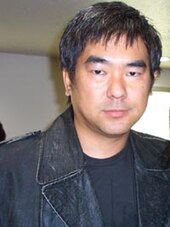Ryuhei Kitamura
Ryūhei Kitamura ( Japanese北 村 龍 平, Kitamura Ryūhei ; born May 30, 1969 in Osaka ) is a Japanese director , screenwriter and producer .
biography
Kitamura developed a great passion for film art as a child . He especially admired Australian directors such as Peter Weir , Russell Mulcahy and George Miller . When he decided to leave school to become a filmmaker at the age of seventeen, he went to Australia and attended the Visual Media School . His graduation film was the short film Exit , which earned him a Kodak Award at the age of nineteen .
After this success, he returned to Japan and founded the independent film studio Napalm Films . With a budget of 300,000 yen and a six-man baton, he shot the 50-minute film Down to Hell in just ten days in 1997 . The film, shot with a high-8 camera, earned him the grand prize of the Indie's Movie Festival . At this time he met the producer Atsuro Watabe , who then produced his first feature film Heat After Dark (1999) and also took on the lead role in it.
Disappointed with the lack of Japanese action films, Kitamura began shooting Versus , a low-budget film that was originally planned as a sequel to Down to Hell . The film brought him worldwide attention for the first time, but above all opened doors for him to larger film producers. After the psychological thriller Alive, based on a manga by Tsutomu Takahashi , with Hideo Sakaki in the lead role, he shot for one of these producers, Shinya Kawai , as part of the episode film Jam Films , in which seven directors were involved , in 2002 . a segment called The Massenger . He finished filming in just ten days. His quick working style also played a role in funding his next film, Aragami . This was created as a bet (known as the Duel Project ) with the well-known Japanese director Yukihiko Tsutsumi , who was also involved in Jam Films . A film had to be made that consisted of only two main actors and one location. This also resulted in Tsutsumi's film 2LDK .
In 2003, Azumi was made , his first high-cost film. The Chambara film, which is based on a manga series by Yuu Koyama , offered him the producer Mataichiro Yamamoto , who was enthusiastic about Versus . Japanese J-Pop singer Aya Ueto , who slips into the title role, received a Japanese Academy Award nomination for Best Actress .
For the opportunity to shoot the 28th Godzilla film, Kitamura even turned down a Hollywood offer and celebrated his greatest success to date. Just in time for the 50th anniversary of Godzilla , Godzilla: Final Wars celebrated its premiere on November 29, 2004 in the USA. It was released a week later in Japan, where the film grossed over 1.2 billion yen.
As the head of motion detection for the GameCube adaptation of Metal Gear Solid , he is, along with Hideo Kojima and Dennis Dyack, part of the creative team that is supposed to make the classic game Metal Gear Solid: The Twin Snakes accessible to a new audience. In Devil May Cry 3 he took part in the creation of a video game one more time.
Filmography
- 1996: Heat After Dark
- 1997: Down to Hell
- 2000: Versus
- 2002: Alive - Death is the better alternative ( Alive )
- 2002: The Messenger
- 2003: Aragami
- 2003: Sky High
- 2003: Azumi
- 2003: Jigoku kōshien (as producer)
- 2004: Longinus
- 2004: Godzilla: Final Wars ( Gojira: Fainaru uōzu )
- 2006: LoveDeath
- 2008: The Midnight Meat Train
- 2009: Baton
- 2012: No One Lives - No one survived! ( No one lives )
- 2014: Lupine the Third - The Master Thief
- 2017: Downrange - You are the target!
- 2018: Nightmare Cinema
Web links
- Ryūhei Kitamura in the Internet Movie Database (English)
- Official website (Japanese and English)
- Napalm films
Individual evidence
| personal data | |
|---|---|
| SURNAME | Kitamura, Ryuhei |
| ALTERNATIVE NAMES | Kitamura Ryuhei; 北 村 龍 平 |
| BRIEF DESCRIPTION | Japanese director, film producer and screenwriter |
| DATE OF BIRTH | May 30, 1969 |
| PLACE OF BIRTH | Osaka , Japan |
